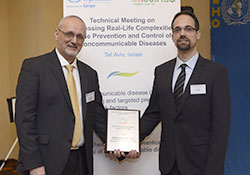New WHO Collaborating Centre on Noncommunicable Diseases Research, Prevention and Control

WHO
Clalit Research Institute was recently designated as the WHO Collaborating Centre on Noncommunicable Diseases Research, Prevention and Control. The inaugural ceremony took place in Tel Aviv on 10 March 2015, on the occasion of the WHO Technical Meeting on Real-life complexities in NCD prevention and control hosted by Clalit.
At the ceremony, Dr Gauden Galea, Director of Noncommunicable Disease and Promoting Health through the Life-course, expressed his enthusiasm at the designation and noted that "information systems have become crucial to the management of the individual patient, to the planning of health services, and to the development of personalized risk scores that can adapt the advice of providers to the personal needs of the patient. In Clalit Research Institute WHO sees a unique resource, pioneering the use of advanced data analytics in the pursuit of higher quality and improved cost-effectiveness. It is hoped this conference will raise the visibility of this work and catalyze other Member States to emulate it."
Professor Ran Balicer, the founding director of Clalit Research Institute and head of the new collaborating centre, stated his hopes that the new collaborating centre will benefit the Member States in utilizing data-driven proactive preventive models for NCD control.
The Director General of the Israel Ministry of Health, Professor Arnon Afek, and Chief Physician of Clalit, Professor Haim Bitterman, attended the ceremony and shared their enthusiasm for the designation. Professor Bitterman noted the importance of this collaboration for Clalit and his gratitude for the inauguration, and Professor Afek noted that "this is an important landmark for us, and an important recognition for Clalit Research Institute, that through its innovative use of health data to support proactive care delivery programmes, can serve as a model for other health systems."



